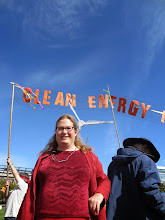While we weren’t looking, a major new market has developed. It could be the next big thing for clean energy in the U.S. It's the market for
green bonds. Especially exciting are the bonds being promoted by Green America,
Clean Energy Victory Bonds.
Clean Energy Victory Bonds (CEVBs) aren’t available yet. They’re proposed U.S. Treasury bonds that will fund clean energy programs supporting wind, solar, energy efficiency, and electric vehicles.
In addition to financing the production of innovative technologies in the U.S., CEVBs will extend proven programs like the
Investment Tax Credit (ITC) for a decade. Now, that’s huge. All over the country, renewable energy advocates have been fretting about what will happen when the ITC runs out at the end of 2016. Extending it would provide a welcome boost to solar and other clean power sources.
What’s more, any American will be able to invest in CEVBs, for as little as $25. That distinguishes them from other green bonds. As Todd Larsen of Green America notes, “Clean Energy Victory Bonds are different in that they will be available to individual investors as well as institutions.” And their low barrier to entry “means that all Americans can afford to purchase one.” In other words, the 75% of us who can’t put solar panels on our own roofs will have another way to participate in and benefit from solar and other renewables.
Read more:
https://joinmosaic.com/blog/clean-energy-victory-bonds




